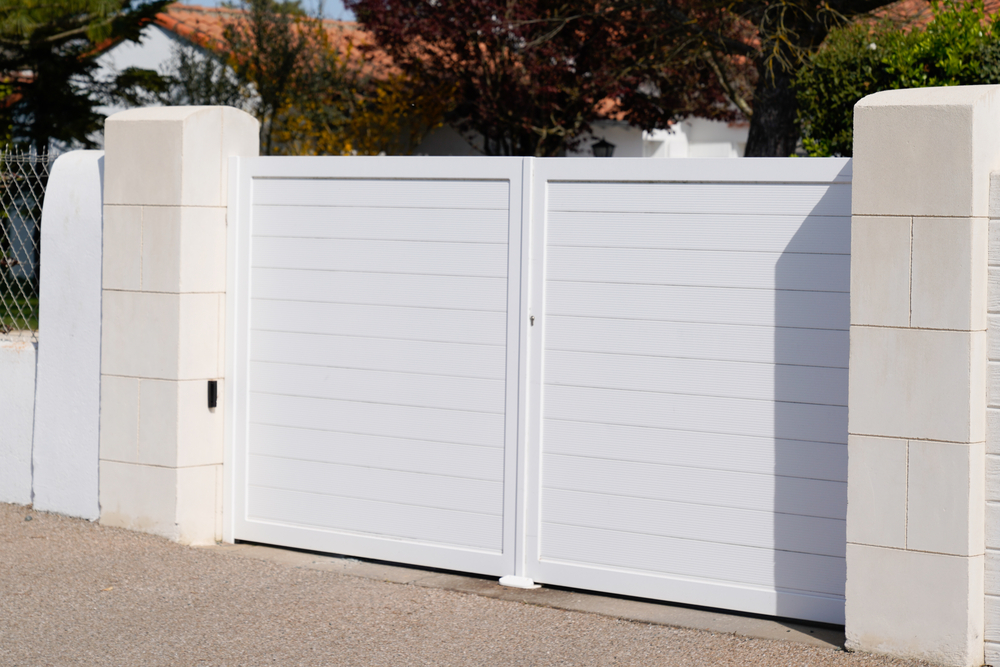By their very nature, electric gates need some form of power if they are going to move when you want them to. There are a number of different ways to provide this power, depending on your property layout and your personal preferences.
In this article we’ll look at the common power sources for electric gates so you’ve got a better idea what to ask from your electrician.
Overview of Electric Gate Power
Contents
There are a number of different ways to provide power for your electric gates. While there are some outliers and variation within the market, generally electric gates are powered by one of the three following options:
- Batteries
- Solar systems
- Mains electricity
Each of these sources of power has their unique benefits and drawbacks. It’s worth considering these before paying to have electric gates installed. In this way, you’ll start off on the right foot, and will avoid the potential for costly corrections further down the road.
Let’s look at each of these in turn.
Batteries as a Power Source for Electric Gates

In what circumstances might a battery-powered electric gate make sense?
Benefits
Ideal for Remote Properties/Gates
Mains electricity isn’t always a practical option. In these cases, battery-powered electric gates can be a worthy alternative.
One example of where this can come in handy is if your electric gates are located a long way from your property. Running an electric cable such a long distance would be expensive and impractical, but batteries can save your day.
Similarly, if you live in an area where mains electricity cannot always be relied on then a battery-powered system can ensure better reliability.
Quick & Cheap to Install
Battery-powered electric gates tend to be quick and easy to install, primarily because you don’t need to worry about fitting new electric cabling from your home or business to the gates. You simply connect up the battery and get going. For those homeowners looking for the lowest-effort installation process then this is surely the best.
Fewer Health and Safety Concerns
Running an electric cable to your gates poses potential health and safety risks. Firstly, you’ll need to ensure the cabling is suitably protected, and secondly that it’s buried to a reasonable depth. Even then, a live cable running across your land can potentially present a health and safety risk, should someone accidentally cut through it when digging at a later date.
Less Reliant on Weather Conditions
Generally speaking batteries are less weather-depending than, for example, a solar system. The battery may drain a little faster in cold winter weather, but at the same time you don’t need to worry about whether there’s enough sunlight to charge it up.
Drawbacks
While battery-powered electric gates might sound ideal, there are some significant disadvantages to be aware of.
Heavy and Inconvenient to Move
Batteries can be bulky and heavy. At some point you’re going to need to recharge them or replace them, and this can require some serious effort. This is especially so if your electric gates are located some distance from your property. Now imagine doing this in bad weather and it’s obvious why some people decide against a battery-powered system.
Requires Regular Recharging
When the batteries run low you’ll start to experience issues with your electric gates. Long before they stop opening or closing entirely, insufficient power can result in electric gates that get stuck part way or open on their own.
A battery-powered electric gate is far from “hands-off” as you need to be routinely replenishing the power. This adds to the effort, and may nullify the “effort saving” aspect of owning electric gates.
Risks Failure in High Use Areas
If your gates are used regularly then there is a risk the battery will run out at a highly inconvenient time. Just as you’re leaving home on the school run, for example. If it’s just a handful of family members using the gates on occasion then this should be far less of an issue.
Solar Powered Electric Gates
Solar powered electric gates often also incorporate a battery. In essence many can be thought of as a battery-powered electric gate that recharges itself. Clearly this has benefits as it removes the need to charge the batteries yourself, except in situations where insufficient sunlight is present for an extended period of time.
Benefits
No Manual Battery Recharging
Assuming it’s been correctly installed, a solar system should recharge your battery on autopilot. This means far less chance of your battery ever running out of power, and it also removes the need to manually recharge the system regularly. This in itself can be a huge time saver for the busy homeowner.
Equally Suitable for Remote Gates/Properties
LIke a stand-alone battery-powered system, solar systems can work just as well in remote locations. This is especially so if your gates happen to face south, where the panel can absorb as much sunlight as possible throughout the day. Just as with the battery-only system this saves time and money in having to hire some workmen, dig a trench, lay a mains cable into it and so on.
Environmentally-Friendly Power Source
By its very nature, solar power is renewable and sustainable. In contrast, much mains electricity comes from non-renewable sources. It could be argued, therefore, that a solar powered electric gate is the most environmentally-friendly option on the market.
Cheaper to Run
The cost of energy just seems to keep going up and up. Little wonder that so many people are looking to limit their energy use wherever possible. A solar-powered electric gate of course benefits from “free” energy from the sun. This makes them cheaper to run, though the initial setup costs may be higher than for the alternatives.
Drawbacks
More Expensive to Install
As mentioned in the previous point, solar powered electric gates can sometimes appear more expensive, due to the fact that you’re having to buy the solar panel(s) in addition to everything else.
While this may be true, be mindful that other power sources may have “hidden” costs that aren’t factored into the equation. For example, running an electric cable to your gates may quickly add to the price.
Requires Decent Light Levels
Direct sunlight is central to an effective solar setup. That means you’ll want to position the solar panel(s) for optimal sunlight. Depending on your property this can be challenging, especially if there are many large trees and shrubs near the target location, casting shade for much of the day.
May Struggle in the Winter Months
Solar panels perform best in bright sunlight. Cloudy weather, snow, mist and more can all negatively affect how much power can be generated. So consider your local climate, especially in the winter months, before making a final decision. In some cases opting for a larger solar array than you think you’ll need may help; as productivity falls in the winter you’ll stand a greater chance of producing the level of power required.
Electric Gates Powered By Mains Electricity
Arguably the most common power source for electric gates is mains power. This makes a lot of sense, as it removes the need to mess around with batteries and chargers. With the previous options, however, it might not be the best option for all situations.
Benefits
Most Practical Long-Term Solution
With the exception of the odd power cut, one of the most appealing draws of powering your electric gates with mains power is simply how reliable they are.
No messing about with flat batteries or hoping there’s enough sunlight for your solar array to work properly.
No matter what the weather, how matter how much you’ve used your electric gates recently, they just work with the minimum of fuss and effort.
Unaffected by Weather Conditions
If you’ve ever tried using solar panels to recharge batteries then you’ll know just how variable the output can be. Snow sitting in the panels can significantly impair their ability to produce energy. Grey, overcast days can cause similar issues, as can the shorter days in the winter. All told, the vagaries of the weather can be a frustrating experience for some electric gate owners.
Mains power, of course, keeps working irrespective of the weather, so you’re unlikely to be caught short in poor weather: those electric gates should keep opening and closing on demand no matter what the weatherman says.
Can Be Used in Conjunction with a Battery
Just because you opt to power your electric gates from the mains doesn’t necessarily mean you have to rely only on that power source. It is entirely possible to fit many electric gates with an additional source of power – a backup battery.
The real benefit of this is when it comes to a power cut. Rather than having to manually open or close your gates under such circumstances, instead the backup battery springs into action, covering the shortfall, running until mains power is restored.
Drawbacks
While so far mains electricity as a power source for electric gates all seems to smell of roses there are a handful of downsides to be aware of…
Will Require the Services of an Electrician
A mains electrical cable can be a dangerous thing if not fitted properly. As a result you are strongly advised to hire a qualified electrician to ensure the cabling is safe and legal. While this isn’t a huge drawback, it can add to the expense and hassle of getting your electric gates up and running.
Additional Cabling Will Be Necessary
How far is it between your electric gates and the nearest power source? If you’re like many people, the answer is quite some distance. Under these circumstances it may be necessary to dig a trench across your land, and lay the cable into this at a depth that prevents anyone from accidentally cutting through it when digging.
This can be a messy process, and whether you dig the trench yourself or hire a professional there are likely to be additional costs such as the hiring of a mini digger to move the earth.
Additional Health & Safety Concerns
A professionally-installed subterranean electrical cable should be safe, but if it is incorrectly installed there will always be a risk of making contact with the cable when spiking your lawn, digging up a plant etc. Be sure to hire only the most qualified and experienced tradesmen for this purpose.
Increases Cost to Run Electric Gates
Unlike solar power, which largely makes electric gates free to run after installation, having gates that operate on mains power will increase your electricity bill somewhat. Exactly how much can depend on a range of factors, so if it’s a concern you’ll need to do some math, but whatever the case your energy bill is going to go up. If you’re very budget-conscious then a mains-powered setup may not be the best option for you.
